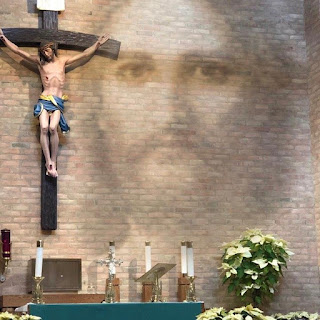This reflection on the total gift-exchange of Holy Communion came out of me earlier on the book of faces. Wanted to share it here, too. [It was my response to a question on whether a non-Catholic Christian can receive the sacrament of Reconciliation.. My thought is that there’s more to it than just yes or no; I’m always interested in the *why*. So here’s my take on the *why*]
What is implied in seeking absolution (in the sacrament is a reconciliation) is a moral/spiritual restoration of full communion in Christ’s Body; the whole Christ (the Totus Christus) which necessarily includes His Bride which is one flesh with Him. So, either that moral/spiritual communion is restored or it is deepened (if no mortal sin was present.)
For one outside of *visible* and *public* full communion with that same Christ and His universal Church such as a.) a Catholic who publicly renounced the Catholic Faith and wishes to repent and confess his sins against faith (aka manifest heresy or apostasy) and be restored to full communion or b.) a baptized Christian who was never in visible and public full communion with Christ’s Church to begin with... These can receive the sacrament of penance (after proper catechetical instruction by the local pastor or RCIA if it is preferred) and absolution when they confess all mortal sins against faith, hope, and charity.
Visible and public full communion happens for the first time or it is restored via the sacrament of confession (and a lifting of any censures for anyone who publicly committed heresy/apostasy but that’s another nuanced conversation)
The restoration of visible and public communion occurs through public confession of sin which allows for the public confession of faith in the liturgical assembly I.e. the Church. This visible and public communion allows for a deepening of one’s moral/spiritual communion with the Body of Christ—especially in Holy Communion.
So, the person is making a public gesture by reorienting themselves towards Christ’s Body; they are declaring that their whole life belongs to the whole Christ (the Totus Christus; all that He is and all that He teaches) when they publicly go to a public representative of Christ *and of* the whole Church—a priest—in order to confess their sins against faith hope and charity so as to receive grace that is sanctifying (even though the confessed sins themselves may not be made publicly known out of prudence and the Church’s/Christ’s compassion) and that sanctifying grace can now grow in that person bringing them from grace to grace towards their Heavenly calling of eternal, public and full communion with the whole Christ in Heavenly.
So public confession of sin and public confession of faith (both done in the midst of “the assembly” or the “Ecclesia” or the Church; i.e. these are liturgical acts) allows for public confession of one’s total love for and hope in Christ via sacramental, Eucharistic Communion with His whole Body, Blood, Soul, and Divinity.
This Eucharistic Communion is a liturgical, public covenant wherein one swears one’s entire being to Jesus—one confesses and swears/vows “I am all yours and everything I have is yours” and the Father says “My child, you are with me always. Everything I have is yours” and He gives us all that He has—His Son—in Holy Communion.
So to receive the sacrament of reconciliation is to say publicly “I am no longer my own; I am “Christ’s” as we seek to love the Lord with our *whole* heart, mind, soul, and strength and love our neighbor as we would wish to be loved (i.e. wholly, completely) This *includes* the total gift of one’s mind in public assent to the Faith of the Church; the confession of the Bride and her public “fiat”; her public acceptance & declaration of exactly Who He is and what He says. As in the marital act when one holds nothing back from one’s spouse, so in a more intimate way one holds nothing back from Christ—even one’s intellectual beliefs clinging to His every word—in the sacrament of reconciliation. It is the necessary preparation
(if there needs to be a restoration of the sanctifying baptismal grace) of the bride-soul-church so as to properly receive all of her Bridegroom—God Himself—in the Eucharistic covenant (aka sacrament)
To sum up, in the midst of the assembly of believers confession of sin and confession of faith (and hope and love) allow for a fuller participation in communion with Christ who has publicly revealed Himself as totally in love with us. Our Bridegroom, then, waits at the altar for His bride.


No comments:
Post a Comment